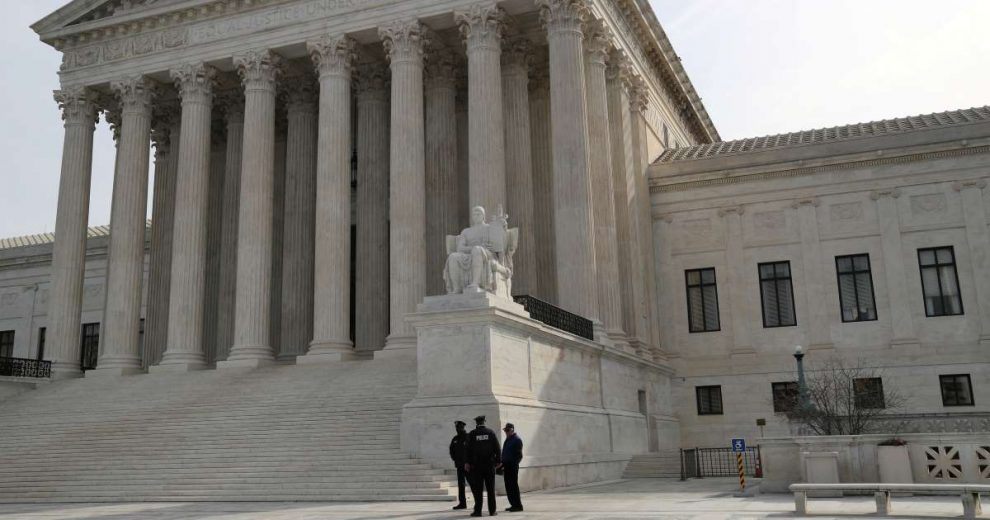WASHINGTON, DC – States may dispose in a dignified manner of the bodies of unborn children who died during abortion, the Supreme Court ruled 7-2 on Monday, while declining to weigh in on sex-selection abortions until another federal appeals court weighs in on such a law.
The bodies of unborn children are typically disposed of in the same manner as “infectious waste.” Indiana lawmakers wanted to address that issue in 2016, and then-Gov. Mike Pence signed a law providing for disposing of the remains of the unborn by either cremation or burial. The Indiana statute also prohibited a woman’s aborting an unborn baby solely because of that child’s race, sex, or disability.
Planned Parenthood immediately sued, and after a federal trial court weighed in, the case went to the U.S. Court of Appeals for the Seventh Circuit. The Chicago-based appellate court held that the dignified-disposal provision was unconstitutional because it was literally “irrational,” and further held that the selective-abortion ban violated the right to abortion declared by the Supreme Court in Roe v. Wade and reaffirmed in Planned Parenthood v. Casey.
Indiana Solicitor General Tom Fisher, who had defended the law in the trial court and on appeal, petitioned the Supreme Court to take the case. On Monday, the justices issued a split decision.
Planning committee expecting outrage at White House ballroom meeting after 9,000 pages of negative comments
GOP begs Trump to endorse Cornyn as president teases decision ‘soon’
White House and State Department defend evacuation strategies for US citizens
Man dies after sneaking into closed section of popular national park
Hegseth Explains Utter Devastation of Iranian Regime’s Defenses – U.S. Close to ‘Uncontested’ Control of Airspace
Trump teases kingmaker endorsement in Texas ‘soon’ to force other candidate out of runoff
Leavitt says ground troops in Iran not currently being considered, doesn’t rule it out
Man killed in Texas after Border Patrol checkpoint flight and shootout
Fact Check: No, Hegseth Did Not Indicate Boots Would Be on the Ground in Iran
Spain urges Trump not to ‘play Russian roulette’ with ‘destiny of millions’ in Iran
NATO defenses shoot down Iranian missile fired toward Turkey, defense ministry says
Trump brings Big Tech executives to White House to curb power costs for American households amid AI boom
Crockett Implies TX Dem Election Chaos in Dallas Was Secretly Racist: ‘I Think We All Know Why’
Dan Crenshaw Loses Primary After Becoming Lone Texas Republican Without Trump’s Endorsement
US ‘winning decisively’ against Iran, will achieve ‘complete control’ of airspace within days, Hegseth says
First, the Supreme Court summarily reversed the Seventh Circuit without requiring any oral argument or briefing on the fetal-remains provision, in a 7-2 decision where liberal Justices Stephen Breyer and Elena Kagan joined the majority.
“This Court has already acknowledged the State has a legitimate interest in proper disposal of fetal remains,” the Court explained in a short per curiam decision (“for the court,” meaning not authored by any individual justice).
The decision was written narrowly, as legal experts would expect in order to get two of the liberal justices to sign on. The opinion implicitly criticized the abortion-rights side for bad lawyering, noting that those lawyers failed to even offer an argument that the fetal-remains provision violated Casey’s legal test of imposing an “undue burden” on women seeking an abortion, and therefore that the Court was not ruling on whether the statute would have been struck down under that standard.
“Our opinion likewise expresses no view on the merits of the second question presented, i.e., whether Indiana may prohibit the knowing provision of sex-, race-, and disability- selective abortions by abortion providers,” the decision continued. “Only the Seventh Circuit has thus far addressed this kind of law. We follow our ordinary practice of denying petitions insofar as they raise legal issues that have not been considered by additional Courts of Appeals.”
Justice Clarence Thomas joined the per curiam decision, and also wrote a lengthy concurring opinion to make additional points on the selective-abortion provision. His opinion will thrill pro-life Americans, referring in a footnote to a woman with a baby in her womb prior to abortion as a “mother.”
Planning committee expecting outrage at White House ballroom meeting after 9,000 pages of negative comments
GOP begs Trump to endorse Cornyn as president teases decision ‘soon’
White House and State Department defend evacuation strategies for US citizens
Man dies after sneaking into closed section of popular national park
Hegseth Explains Utter Devastation of Iranian Regime’s Defenses – U.S. Close to ‘Uncontested’ Control of Airspace
Trump teases kingmaker endorsement in Texas ‘soon’ to force other candidate out of runoff
Leavitt says ground troops in Iran not currently being considered, doesn’t rule it out
Man killed in Texas after Border Patrol checkpoint flight and shootout
Fact Check: No, Hegseth Did Not Indicate Boots Would Be on the Ground in Iran
Spain urges Trump not to ‘play Russian roulette’ with ‘destiny of millions’ in Iran
NATO defenses shoot down Iranian missile fired toward Turkey, defense ministry says
Trump brings Big Tech executives to White House to curb power costs for American households amid AI boom
Crockett Implies TX Dem Election Chaos in Dallas Was Secretly Racist: ‘I Think We All Know Why’
Dan Crenshaw Loses Primary After Becoming Lone Texas Republican Without Trump’s Endorsement
US ‘winning decisively’ against Iran, will achieve ‘complete control’ of airspace within days, Hegseth says
“This statute makes it illegal for an abortion provider to perform an abortion in Indiana when the provider knows that the mother is seeking the abortion solely because of the child’s race, sex, diagnosis of Down syndrome, disability, or related characteristics,” Thomas began, adding that all of those matters can be detected early in a pregnancy. “Put differently, this law and other laws like it promote a State’s compelling interest in preventing abortion from becoming a tool of modern-day eugenics.”
Thomas continued on eugenics, abortion, and Planned Parenthood’s founder, writing:
The use of abortion to achieve eugenic goals is not merely hypothetical. The foundations for legalizing abortion in America were laid during the early 20th-century birth-control movement. That movement developed alongside the American eugenics movement. And significantly, Planned Parenthood founder Margaret Sanger recognized the eugenic potential of her cause. She emphasized and embraced the notion that birth control “opens the way to the eugenist.” As a means of reducing the “ever increasing, unceasingly spawning class of human beings who never should have been born at all,” Sanger argued that “Birth Control . . . is really the greatest and most truly eugenic method” of “human generation.” In her view, birth control had been “accepted by the most clear thinking and far seeing of the Eugenists themselves as the most constructive and necessary of the means to racial health.”
Thomas noted that Planned Parenthood’s Sanger sometimes differentiated contraceptives from abortion, but then lauded all forms of birth control as resulting in what she called “the elimination of the unfit.”
“Whereas Sanger believed that birth control could prevent ‘unfit’ people from reproducing, abortion can prevent them from being born in the first place,” Thomas added. “Many eugenicists therefore supported legalizing abortion, and abortion advocates—including future Planned Parenthood President Alan Guttmacher—endorsed the use of abortion for eugenic reasons.”
Planning committee expecting outrage at White House ballroom meeting after 9,000 pages of negative comments
GOP begs Trump to endorse Cornyn as president teases decision ‘soon’
White House and State Department defend evacuation strategies for US citizens
Man dies after sneaking into closed section of popular national park
Hegseth Explains Utter Devastation of Iranian Regime’s Defenses – U.S. Close to ‘Uncontested’ Control of Airspace
Trump teases kingmaker endorsement in Texas ‘soon’ to force other candidate out of runoff
Leavitt says ground troops in Iran not currently being considered, doesn’t rule it out
Man killed in Texas after Border Patrol checkpoint flight and shootout
Fact Check: No, Hegseth Did Not Indicate Boots Would Be on the Ground in Iran
Spain urges Trump not to ‘play Russian roulette’ with ‘destiny of millions’ in Iran
NATO defenses shoot down Iranian missile fired toward Turkey, defense ministry says
Trump brings Big Tech executives to White House to curb power costs for American households amid AI boom
Crockett Implies TX Dem Election Chaos in Dallas Was Secretly Racist: ‘I Think We All Know Why’
Dan Crenshaw Loses Primary After Becoming Lone Texas Republican Without Trump’s Endorsement
US ‘winning decisively’ against Iran, will achieve ‘complete control’ of airspace within days, Hegseth says
“This case highlights the fact that abortion is an act rife with the potential for eugenic manipulation,” he went on later in the opinion. “From the beginning, birth control and abortion were promoted as means of effectuating eugenics.”
“Whatever else might be said about Casey, it did not decide whether the Constitution requires States to allow eugenic abortions,” Thomas concluded in his 20-page concurrence. “Although the Court declines to wade into these issues today, we cannot avoid them forever.”
The decision also notes that Justice Sonia Sotomayor would have denied review on both issues in the case.
Justice Ruth Bader Ginsburg wrote a dissenting opinion, arguing that all the challenged provisions of Indiana’s law are unconstitutional. She also criticized Justice Thomas for referring to a pregnant woman as a “mother.”
The case is Box v. Indiana Department of Health, No. 18-483 in the Supreme Court of the United States.
Story cited here.
























